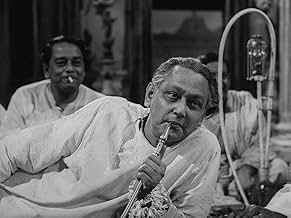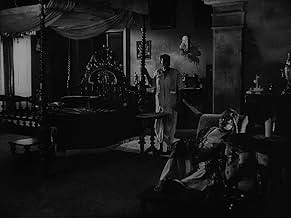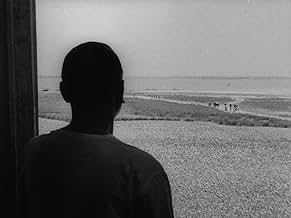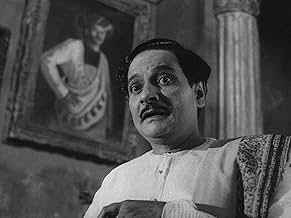Riche propriétaire indien vivant avec sa femme et son fils, Biswambhar Roy dilapide l'argent de la famille en organisant des concerts chez lui. Il perd toute sa fortune en voulant rivaliser ... Tout lireRiche propriétaire indien vivant avec sa femme et son fils, Biswambhar Roy dilapide l'argent de la famille en organisant des concerts chez lui. Il perd toute sa fortune en voulant rivaliser avec son voisin.Riche propriétaire indien vivant avec sa femme et son fils, Biswambhar Roy dilapide l'argent de la famille en organisant des concerts chez lui. Il perd toute sa fortune en voulant rivaliser avec son voisin.
- Réalisation
- Scénario
- Casting principal
- Récompenses
- 3 victoires et 2 nominations au total
- Mahamaya, Roy's wife
- (as Padma Devi)
- Singer
- (as Begum Akhtar)
- Ustad Ujir Khan
- (as Ostad Wahed Khan)
Avis à la une
Jalsaghar was Ray's fourth film which he made after the commercial failure of Aparijito—the finally film in Ray's much acclaimed "The Apu Trilogy". Ray had initially thought of making a commercial film, based on some popular work of literature, which would incorporate popular Indian music. But, what eventually transpired was something that was totally different. It was more of an art-house work than a commercial movie that Ray had initially intended to make. The movie failed to do well at the Indian box-office. But, it received both critical and financial success in Europe and the US and helped Ray earn international reputation. The music of Jalsaghar was written by the Indian composer and sitar maestro Ustad Vilayat Ali Khan who was encouraged by Ray to compose musical pieces that would gel well with the movie's dark and gloomy tone. The movie's melancholic musical composition and sombre art direction—the sublime use of mirrors, chandeliers, etc.—gives it a Gothic feel in the vein of American Film-Noir films of the '40s and '50s.
In Jalsaghar, Ray highlights the perpetual conflict of tradition versus modernity while simultaneously examining the Indian caste system. Jalsaghar is a sublime work of cinema that, having stood the test of time for over five decades, continues to inspire the budding filmmakers as well as enthrall the audiences worldwide. Jalsaghar is widely regarded as Satyajit Ray's most evocative film. It serves to be a great means of getting acquainted with Ray's oeuvre. Jalsaghar with its universal motifs is also the most accessible of Ray's films, especially for foreign viewers. Jalsaghar is not a movie that would woo a casual viewer. Restless viewers should best stay away from it. But, a patient viewer would be thoroughly rewarded. The movie owing to its slow pace may pose impediments to the uninitiated viewer. Jalsaghar is a deeply thought-provoking work of cinema that demands multiple viewings. The movie is a must watch for every student of cinema. Jalsaghar.is an essential watch for all Satyajit Ray fans as well as those who understand and appreciate intelligent cinema. 10/10
A more in-depth review of the film can be read at:
http://www.apotpourriofvestiges.com/
I loved seeing and hearing the various musical instruments, the wonderful vocalizations, and the performances - especially that dancer towards the end - they were something special. The rest of it had meaning, but was less compelling for me, despite all the craft and attention to detail director Satyajit Ray put in. It would have been more interesting had we had gotten more depth and insight into some of the other characters. Certainly worth watching though.
"The Music Room", as it is known in English, is as much about the power of cinema as it is about that of music. It is as much about life as it is about death, both elliptically consummate by reason of each other: art as a life of inspiration, inspiration as regained strength. Art as addiction, addiction as loneliness, loneliness as death.
The ending is one of the most filmically mesmerizing moments I know of. Light and shadow, derangement and perspicuity, again life and death. And as for the Blu-ray (Region A) released by the Criterion Collection in 2011, it's phenomenal to the hilt, a cultural act in itself, in my books among their most enduring and best releases so far (perhaps only the complete Jean Vigo compares).
Le saviez-vous
- AnecdotesThe film is included on Roger Ebert's "Great Movies" list.
- GaffesAfter talking to his wife about the cost of the music party, a close-up shows the landlord falling asleep with his hand bent down at the wrist. After the cut to medium, his hand lies straight up in his neck.
- Citations
Huzur Biswambhar Roy: [laughing drunkenly, deriding the moneylender's son, Ganguly] He failed. He failed!
Huzur Biswambhar Roy: [now talking to his servant Ananta, who is refilling his glass with liquor] He couldn't do it. He couldn't do it! That moneylender's son! He wanted to be king of the mountain. What arrogance, huh? What arrogance! A dwarf reaching for the moon! He couldn't do it. You know why he failed?
Huzur Biswambhar Roy: [speaking directly to Ananta] Blood! The blood in my veins! You know whose blood flows in my veins? You want to see? Come...
Huzur Biswambhar Roy: [proceeding to point out portraits on the wall of his elders] My father... my grandfather... my great grandfather... my great-great grandfather.
- ConnexionsFeatured in Celluloid Man (2012)
Meilleurs choix
Détails
- Date de sortie
- Pays d’origine
- Site officiel
- Langues
- Aussi connu sous le nom de
- The Music Room
- Lieux de tournage
- Nimtita Rajbari, Nimtita, West Bengal, Inde(The House)
- Société de production
- Voir plus de crédits d'entreprise sur IMDbPro
Box-office
- Montant brut mondial
- 3 247 $US
- Durée
- 1h 40min(100 min)
- Couleur
- Mixage
- Rapport de forme
- 1.37 : 1














